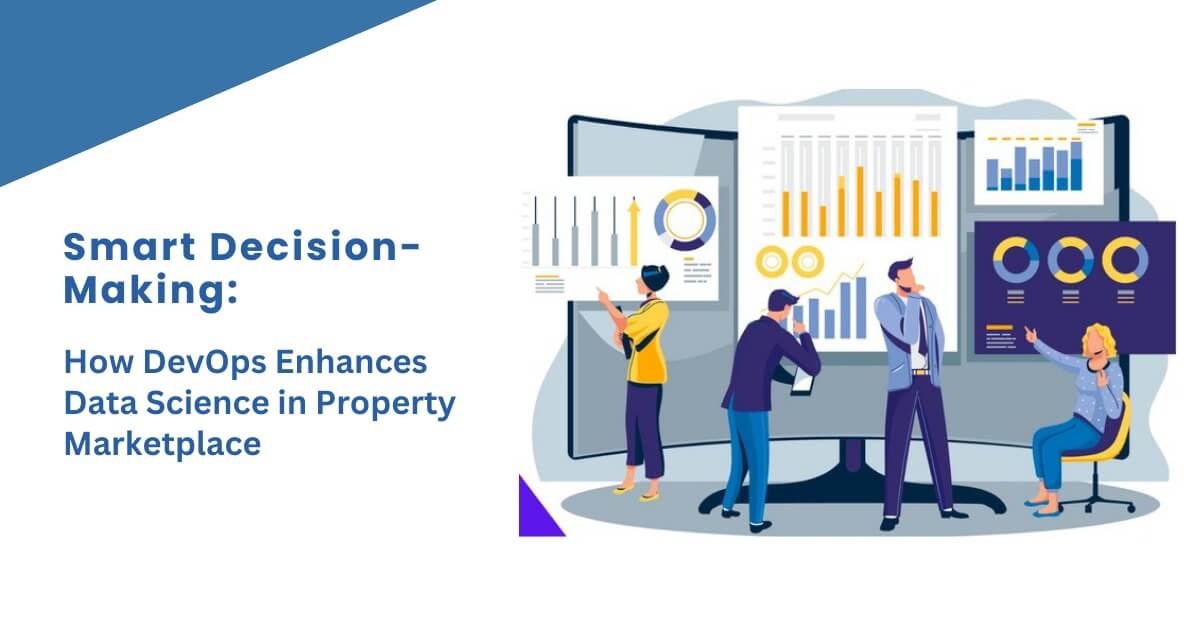Introduction
- The Intersection of DevOps and Data Science in Real Estate: Imagine navigating the dynamic real estate landscape armed with both the power of data analysis and the agility of rapid software development. This confluence of data science and DevOps is revolutionizing the industry, empowering smarter decision-making at every turn.
- Importance of Smart Decision-Making in the Real Estate Industry: In today's competitive market, every decision carries weight. From strategic acquisitions to optimal pricing strategies, real estate professionals need a clear vision based on accurate data. This is where the symbiotic relationship between data science and DevOps shines, delivering actionable insights and the agility to capitalize on them.
The Role of Data Science in Real Estate Decision-Making
- Defining Data Science and its Significance in Real Estate: Data science is the art of extracting valuable insights from vast data sets. In real estate, it translates market trends, tenant behavior, and property performance into actionable intelligence. This newfound clarity informs smart investments, optimizes resource allocation, and personalizes tenant experiences.
- The Impact of Data-Driven Insights on Decision-Making Processes: Data science isn't just about crunching numbers; it's about transforming them into actionable knowledge. Imagine predicting market surges, identifying undervalued properties, and tailoring marketing campaigns based on tenant demographics – all driven by data-driven insights. This empowers real estate professionals to move beyond gut instincts and towards strategic, data-backed decisions.
Introduction to DevOps in Real Estate
- Explaining the Fundamentals of DevOps: DevOps is a collaborative approach that merges software development (Dev) and IT operations (Ops) into a seamless unit. This eliminates communication silos, accelerates development cycles, and ensures rapid deployment of software solutions.
- Understanding the Benefits of DevOps in Software Development for Real Estate: In the context of real estate, DevOps translates to faster development and deployment of data analysis tools, AI-powered algorithms, and real-time dashboards. This agility provides a constant flow of fresh insights, keeping real estate professionals ahead of the curve.
Enhancing Decision-Making with DevOps Practices
- Streamlining Data Processes through DevOps: DevOps practices automate repetitive tasks like data pipelines, model training, and report generation. This frees up data scientists to focus on higher-level analysis and interpretation, accelerating the generation of valuable insights.
- Agile Methodologies for Quicker and Smarter Decision-Making: DevOps embraces agile methodologies, promoting iterative development and continuous feedback loops. This allows real estate professionals to test and refine data-driven models quickly, ensuring their decisions are based on the most up-to-date information.
Agile Real Estate Development: DevOps Strategies for Rapid Decision-Making
- Agile Practices in Real Estate Software Development: DevOps principles extend beyond just data analysis tools. They can be applied to the development of property management software, tenant portals, and marketing platforms. This agile approach leads to quicker feature releases, faster bug fixes, and a constant stream of improvements based on real-time user feedback.
- How DevOps Accelerates Decision-Making through Continuous Delivery: By automating build, testing, and deployment processes, DevOps ensures continuous delivery of software updates. This allows real estate professionals to leverage new features and data-driven insights almost instantly, empowering them to make agile decisions in a rapidly evolving market.
Ensuring Efficiency in Real Estate Operations
- Efficiency Gains through the Integration of DevOps and Data Science: The combined power of DevOps and data science streamlines workflows, automates manual tasks, and eliminates data silos. This translates to operational efficiency gains, reduced costs, and improved resource allocation.
- Overcoming Challenges and Optimizing Processes: By breaking down communication barriers and facilitating collaboration between data scientists and developers, the integrated approach helps overcome challenges and optimize processes, leading to a more data-driven and efficient real estate organization.
Collaboration Between Data Science and DevOps Teams
- The Importance of Collaboration Between Data Science and DevOps Teams: Building a bridge between data scientists and DevOps engineers is crucial for success. Fostering open communication, shared goals, and a collaborative spirit ensures smooth integration of data analysis tools and rapid deployment of data-driven solutions.
- Strategies for Fostering Effective Teamwork: Implement joint training sessions to bridge the knowledge gap and build a shared understanding of data analysis tools and real estate workflows. Encourage cross-team collaboration on projects, where data scientists can guide developers on integrating data insights into software features, and developers can provide feedback on the usability and functionality of data analysis tools. Foster an environment of open communication, where data scientists and developers feel comfortable sharing ideas, concerns, and progress openly. Lastly, consider implementing reward systems that incentivize collaboration and successful integration of data science and DevOps initiatives.
By implementing these strategies, you can break down silos, cultivate trust, and foster a culture of collaborative innovation that fuels success in the data-driven future of real estate.
Continuous Improvement in Real Estate Tech
- Implementing Continuous Improvement Methodologies: DevOps embraces continuous improvement (CI) methodologies, fostering a culture of constant learning and optimization. This ensures your data analysis tools and real estate software evolve alongside market trends and tenant needs.
-
- A/B testing: Test different algorithms and data models to identify the most effective configurations for real-world scenarios.
- Metrics and monitoring: Monitor key performance indicators (KPIs) related to data analysis and software performance to identify areas for improvement.
- Feedback loops: Actively seek feedback from tenants, property managers, and data scientists to refine your data-driven initiatives.
- How DevOps Facilitates Ongoing Enhancement in Real Estate Software: By automating software testing, deployment, and updates, DevOps simplifies the cycle of implementing new features and improvements based on data insights. This rapid cycle of continuous improvement ensures your real estate software remains cutting-edge and provides maximum value.
Future Trends: The Evolution of DevOps and Data Science in Real Estate
- Exploring Emerging Trends in DevOps and Data Science for Real Estate: The future of real estate promises exciting advancements in the integration of DevOps and data science:
- Artificial intelligence (AI) and machine learning (ML): AI-powered algorithms will automate complex data analysis tasks, generate even more sophisticated insights, and personalize tenant experiences.
- Internet of Things (IoT): Sensor data from smart buildings will provide real-time insights into energy consumption, tenant activity patterns, and equipment performance, further optimizing operations and decision-making.
- Big data analytics: Advanced analytics tools will handle massive datasets, enabling deep analysis of market trends, tenant behavior, and predictive modeling across entire portfolios.
- Anticipated Advancements and Innovations: Expect to see:
- Pre-built data pipelines and AI model templates: Streamlined solutions will make data analysis and AI implementation accessible even to smaller real estate businesses.
- Predictive maintenance: AI-powered algorithms will anticipate equipment failures and schedule maintenance proactively, minimizing downtime and costs.
- Hyper-personalized tenant experiences: Data-driven insights will tailor services, amenities, and communications to individual tenant preferences, leading to higher satisfaction and retention.
Conclusion
- Recap of the Key Insights on How DevOps Enhances Data Science for Smart Decision-Making: This blog explored the powerful synergy between DevOps and data science in real estate. We highlighted how this integration:
- Empowers data-driven decision-making through actionable insights.
- Streamlines data processes and accelerates model development.
- Provides continuous delivery of fresh insights and software updates.
- Enhances operational efficiency and optimizes resource allocation.
- Fosters a culture of continuous improvement and innovation.
- B. Encouragement for Real Estate Professionals to Embrace These Synergies for Future Success: The future belongs to those who embrace data-driven decision-making and agile software development. By harnessing the combined power of DevOps and data science, real estate professionals can gain a competitive edge, navigate market fluctuations with confidence, and create lasting value for their businesses and tenants.


No comments yet